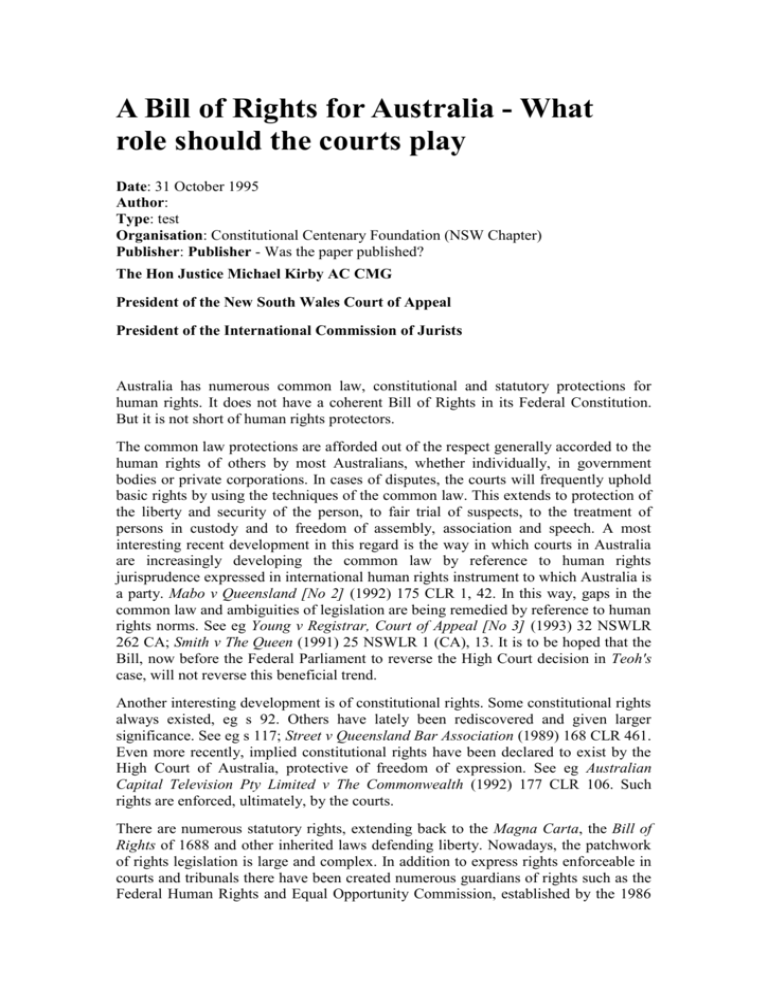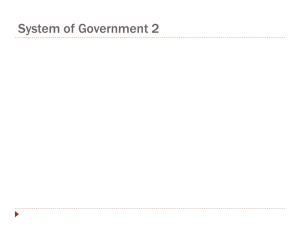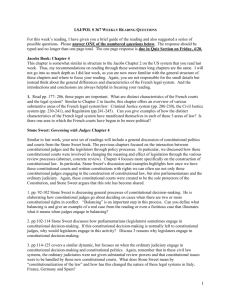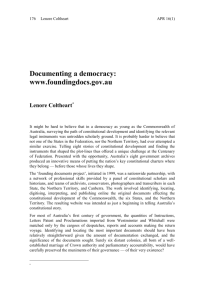1288 - A Bill of Rights for Australia
advertisement

A Bill of Rights for Australia - What role should the courts play Date: 31 October 1995 Author: Type: test Organisation: Constitutional Centenary Foundation (NSW Chapter) Publisher: Publisher - Was the paper published? The Hon Justice Michael Kirby AC CMG President of the New South Wales Court of Appeal President of the International Commission of Jurists Australia has numerous common law, constitutional and statutory protections for human rights. It does not have a coherent Bill of Rights in its Federal Constitution. But it is not short of human rights protectors. The common law protections are afforded out of the respect generally accorded to the human rights of others by most Australians, whether individually, in government bodies or private corporations. In cases of disputes, the courts will frequently uphold basic rights by using the techniques of the common law. This extends to protection of the liberty and security of the person, to fair trial of suspects, to the treatment of persons in custody and to freedom of assembly, association and speech. A most interesting recent development in this regard is the way in which courts in Australia are increasingly developing the common law by reference to human rights jurisprudence expressed in international human rights instrument to which Australia is a party. Mabo v Queensland [No 2] (1992) 175 CLR 1, 42. In this way, gaps in the common law and ambiguities of legislation are being remedied by reference to human rights norms. See eg Young v Registrar, Court of Appeal [No 3] (1993) 32 NSWLR 262 CA; Smith v The Queen (1991) 25 NSWLR 1 (CA), 13. It is to be hoped that the Bill, now before the Federal Parliament to reverse the High Court decision in Teoh's case, will not reverse this beneficial trend. Another interesting development is of constitutional rights. Some constitutional rights always existed, eg s 92. Others have lately been rediscovered and given larger significance. See eg s 117; Street v Queensland Bar Association (1989) 168 CLR 461. Even more recently, implied constitutional rights have been declared to exist by the High Court of Australia, protective of freedom of expression. See eg Australian Capital Television Pty Limited v The Commonwealth (1992) 177 CLR 106. Such rights are enforced, ultimately, by the courts. There are numerous statutory rights, extending back to the Magna Carta, the Bill of Rights of 1688 and other inherited laws defending liberty. Nowadays, the patchwork of rights legislation is large and complex. In addition to express rights enforceable in courts and tribunals there have been created numerous guardians of rights such as the Federal Human Rights and Equal Opportunity Commission, established by the 1986 Act of the Federal Parliament with specialised Commissioners empowered to investigate complaints of discrimination on racial, sexual, disability or privacy grounds. In the States, there are specialised bodies, such as the Anti-Discrimination Board of New South Wales, the Privacy Committee, the Mental Health Review Tribunal, the Guardianship Board etc. They all protect human rights. What Australia lacks is a coherent rights jurisprudence founded upon basic principles stated in the national Constitution. Past reservations about a constitutional bill of rights are well known and have recently been recited by me. For a long time I opposed the introduction of a Bill of Rights. That was the legal tradition in which I grew up. The fundamental reasons for my change of mind and for my present inclination to support a constitutional bill of rights (despite some dangers) are: the adoption of such a constitutional reform would make much more legitimate moves that have already occurred to some extent in the courts, but without the specific endorsement of the people of Australia; legislators constantly fail to attend to the controversial issues of basic rights. The gaps in their attention should be filled by the courts, deriving a fresh source of legitimacy and authority from a Bill of Rights adopted by the people of Australia; adoption of a Bill of Rights would enable and promote civic education in the fundamental bases upon which Australians live together; and acceptance of a Bill of Rights, limiting the powers of Parliaments, would reflect the modern understanding of democracy in Australia. This is not brute majoritarianism but a complex system which respects the will of the majority whilst protecting the rights of minorities and vulnerable groups and individuals within society. A Bill of Rights would facilitate such protection. The provision of checks and balances upon power in a Bill of Rights is a natural complement to the Federal system of government itself which also puts restrictions on the exercise of power. Our Constitution embraced federalism. The time has come for it also to embrace constitutional protection of fundamental rights. But it depends upon our having the maturity and wisdom to agree on a basic charter of rights. If we cannot, the judges will continue to use the common law to protect basic rights as best they can. The fact that Australia is now one of the only countries in the world without a constitutional charter of rights does not necessarily mean that we are out of step and out of date. But it is at least a good reason, whilst we are conducting a review of our century old constitution, to look again at the decision to omit from it a Bill of Rights. Perhaps the fast changing character of Australian society today could afford another reason to enshrine the fundamental values in a constitutional charter which a monochrome society a century ago did not feel it needed.











